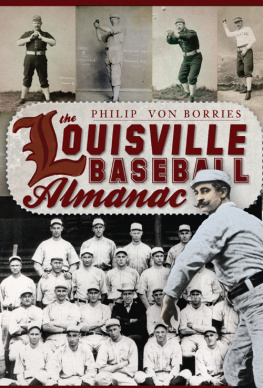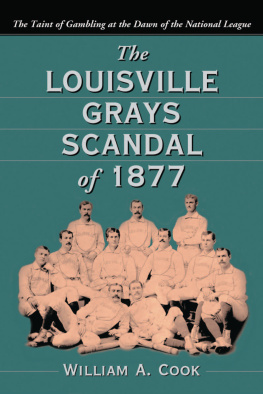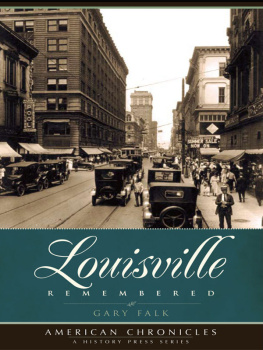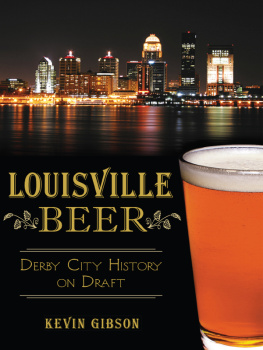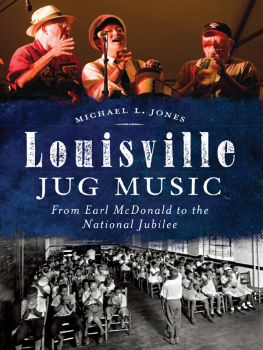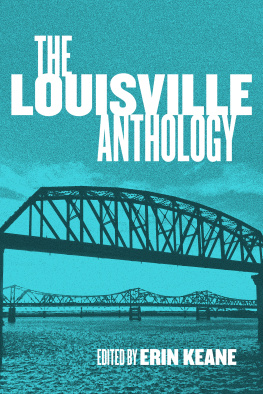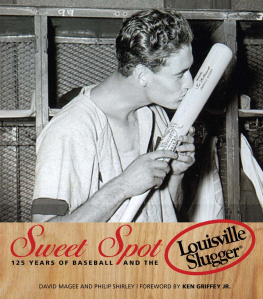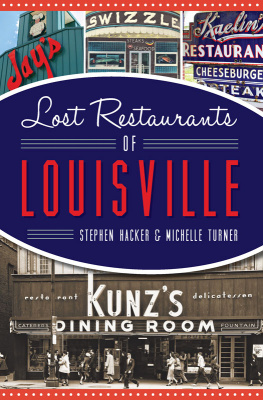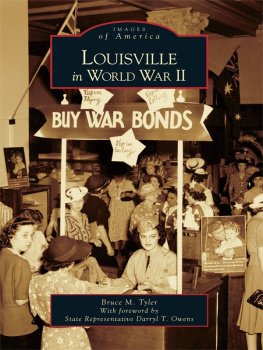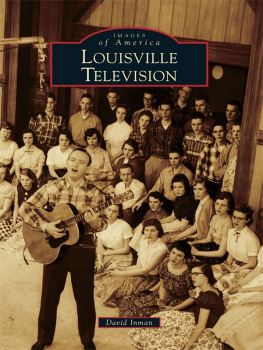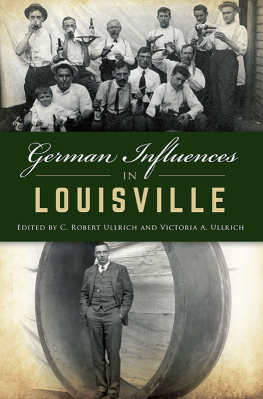

PHILIP VON BORRIES

Published by The History Press
Charleston, SC 29403
www.historypress.net
Copyright 2010 by Philip Von Borries
All rights reserved
Front cover: Top, left to right: Guy Hecker, Red Ehret, William Wolf, Gus Weyhing. Bottom: 1916 Louisville American Association Colonels. Overlapping: Tony Mullane. All pictures courtesy of the National Baseball Hall of Fame Library, Cooperstown New York.
First page: Sketch of an old-time Louisville minor-leaguer based on 1920s Louisville Colonels star
Joe Guyon. Eclipse BBHR.
First published 2010
e-book edition 2012
ISBN 978.1.61423.273.5
Library of Congress Cataloging-in-Publication Data
Von Borries, Philip, 1947
The Louisville baseball almanac / Philip Von Borries.
p. cm.
Includes bibliographical references and index.
print edition ISBN 978-1-59629-994-8
1. Baseball--Kentucky--Louisville--History. I. Title.
GV863.K46L 68 2010
796.3570976944--dc22
2010019894
Notice: The information in this book is true and complete to the best of our knowledge. It is offered without guarantee on the part of the author or The History Press. The author and The History Press disclaim all liability in connection with the use of this book.
All rights reserved. No part of this book may be reproduced or transmitted in any form whatsoever without prior written permission from the publisher except in the case of brief quotations embodied in critical articles and reviews.
C ONTENTS
Y ESTERYEAR
Most of the [Pittsburgh] Pirates were busy yesterday morning selecting wagon tongues at Hillerichs bat factory thirty minutes after the team stepped from the Illinois Central train.
Louisville Courier-Journal, Tuesday, April 3, 1900
Second-baseman Homer C. Hausens recent fight on the diamond here with Catcher Bill Wilson of Omaha cost him his position on the Sioux City [Iowa] nine, but won him a wife. It was in defense of his sweethearts reputation that he struck Wilson a terrific blow over the head with a baseball bat. His friends sympathized with him, but agreed that the time and place for action were ill chosen. President Hickey, of the Western League, was so sure of it that he blacklisted him.
Mrs. Jessie Pierce, of Kansas City, didnt take this view of the case. She only knew that the blow had been struck in her defense, and respected her athletic lover the more for his ardor. Last morning, she arrived here, and not many minutes later, Rev. Robert Bagnell, of the First Methodist Church, had pronounced them husband and wife.
Louisville Courier-Journal, Tuesday, July 24, 1900
A few years ago at Maysville, Ky., the Reds lost an exhibition game under remarkable circumstances. The local team was at bat in the ninth inning, with one man on base and two runs needed to win.
There were two out when the batsman tore off a swat that would ordinarily have been good for two bases, but the ball, rolled into a peach can in left field and stuck there. Being unable to extricate the ball, the left fielder relayed the can and contents to the shortstop, who passed it to the third baseman.
Meanwhile, a run had scored from second base, and the batsman, seeing the can headed his way, kept on coming. He was half way between third and home when the third baseman threw the canned ball to the catcher, and that player tagged the runner twenty feet from the plate.
The Reds naturally contended that the man was out, while the umpire held that he was simply touched with the tin can and not with the ball. Therefore, the run counted.
Louisville Courier-Journal, Friday, September 14, 1900
Louisville seems to me the most demoralizing city in the major league, and in that belief, I am sustained by certain players who have been on Louisville contracts off and on the past ten years, says [Nap] Lajoie.
Its Kentucky hospitality, with the latchstring nodding in the wind on the outside, and the decanter ever ready for the invitation on the sideboard.
McGee [Bill Magee], Pitcher Pete Dowling and old Gus Weyhing are among the players on the Louisville teams of past seasons, who fell for Kentucky hospitality, in their effort to retain their membership in the Kentucky order of good fellowship. Barney Dreyfuss was glad to transfer some of his most promising players from Louisville to Pittsburgh, especially Rube Waddell, who is inclined to be a deucedly sporty boy, a devil of a fellow, as Bertie says in the play.
Louisville Courier-Journal, Wednesday, February 21, 1900
Heavyweight champion James J. Jeffries umpired a match between the Nicelys and the Porzigs on Sunday, June 10, 1900 in Louisville. The Porzigs won 114, with the Courier-Journal commenting the next day that Jeffries Is A Good Umpire.
Some 2,000 fans attended the game held at League Park [the citys third major-league park, also known as Eclipse Park II, located at Twenty-eighth and Broadway].
James Jackson Jeffries [18751953] was this countrys heavyweight champion from 1899 to 1905, when he retired undefeated. He made an unsuccessful comeback against Jack Johnson in 1910.
Louisville Courier-Journal, Monday, June 11, 1900
The Louisville Courier-Journal carries this fascinating pickup from the neighboring Shelbyville Sentinel: that on August 14, 1867, one of the first baseball games ever played in Kentucky saw a Lawrenceburg club best the Shelby Baseball Club of Hardsinville [Kentucky] 14041.
The score is no typo, and neither are the following stats. Lawrenceburg had 14 home runs (the Shelbys had three). There were also 31 passed balls in the game, 19 of them by the Shelbys. A scorekeepers nightmare all the way to say the least.
Louisville Courier-Journal, Sunday, August 5, 1900
While on their way to St. Paul yesterday afternoon, the train on which the Colonels were traveling was wrecked near Lafayette, Ind. The engineer and fireman of the train were killed and six passengers were severely injured. None of the Louisville players was hurt, but received a severe shaking-up. The wreck was caused by an open switch, and the train was running at a high rate of speed.
The mail and baggage cars were completely wrecked and four passenger coaches were thrown from their trucks and dashed 100 feet ahead of the engine, which buckled. The parlor car at the rear of the train did not leave the track. Almost every passenger was either cut by flying glass or bruised. Several narrowly escaped death.
Immediately after being able to leave their car, the players rushed into the work of getting the unfortunate passengers out of the wreck. Outfielder [Dan] Kerwin, shortstop [Larry] Quinlan and Pitcher [Ed] Kenna did heroic work, and greatly aided the rescuers in alleviating the suffering of the injured passengers.
Louisville Evening Post, Tuesday, May 16, 1905
NOTE: This was not their season. In late August, a Kansas City, Missouri trolley accident injured seven players and the team secretary. The most seriously injured was one of the train wreck heroes, Ed Kenna, whose career ended prematurely because of the Kansas City accident.

